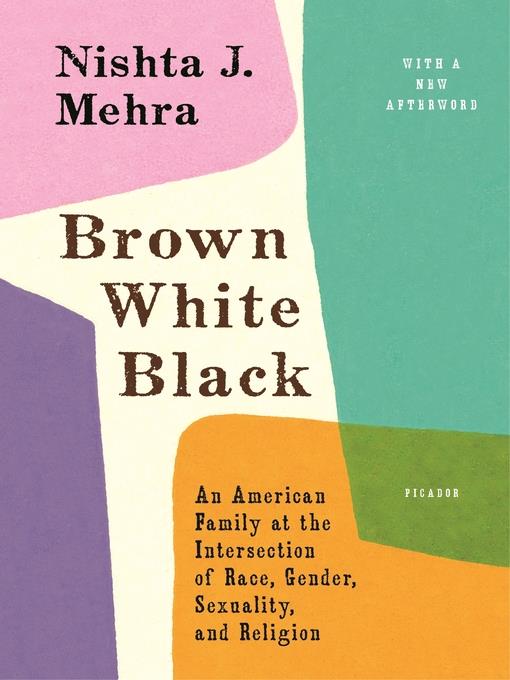
Brown White Black
An American Family at the Intersection of Race, Gender, Sexuality, and Religion
کتاب های مرتبط
- اطلاعات
- نقد و بررسی
- دیدگاه کاربران
نقد و بررسی

November 1, 2018
Two women, an adopted black son, and the prejudices and fears they endure as a family.Mehra (The Pomegranate King, 2013) is "the first-generation daughter of Indian immigrants." She's also a lesbian married to a white woman, and they have adopted a black son. In this candid and sometimes angry, bitter series of essays, the author explores how difficult it can be to be anything but white in America. "Our family doesn't fit well into boxes," she writes. "We don't fit at all." From an early age, she writes, she felt different than her peers because her skin was brown, she sometimes wore different clothes, and the food she ate at home was unlike what the other children ate. At times, she embraced her Indian heritage, but occasionally, she was ashamed of it, which was especially stressful for her father, who died when Mehra was in her 20s. The author is annoyed at the appropriation by non-Indians of symbols that have importance to the Hindu faith. She discusses the tension and anxiety surrounding her coming out as a lesbian, and she shares her fears for her black son. "Becoming the parent of a black son," writes Mehra, "has given me the perspective to see that there is a real reluctance to engage in a conversation about the Asian American community's participation in anti-black racism. Related to this is a tendency to accommodate and apologize; I learned early on that white people are bad at being uncomfortable." The essays feature a mostly smooth, engaging mix of pride, passion, frustration, and anger. Numerous times Mehra has been unnecessarily questioned about her life. With this book, she makes a strong statement about the importance of moving beyond gender and racial barriers toward a more inclusive view of family life.Full of a wide range of insights and emotions, these essays effectively show the difficulties of being a mixed-race, same-sex family in America.
COPYRIGHT(2018) Kirkus Reviews, ALL RIGHTS RESERVED.

Starred review from January 1, 2019
Mehra (The Pomegranate King) blends memoir and cultural analysis to dive into the complex realities of race, gender, ethnicity, sexuality, and the constructs that surround these topics. Told through the lens of Mehra's experience as the first-generation daughter of Indian immigrants, raised in a predominantly white neighborhood in Tennessee, this work wrestles with the author's own privilege as she examines the narratives of her youth, her sexuality, her relationship with her parents, her wife, Jill, and her black son, Shiv, whose expression of gender inspires a new awareness of Mehra's own unconscious biases. It is through her relationships that Mehra learns and grows, the process sometimes painful as she bumps against rigid expectations, including those of her father. Her experience of adoption is especially inspiring, as is her account of Shiv's exploration of gender. VERDICT Mehra's nuanced and thought-provoking work resonates on multiple levels--from the immigrant experience and race relations to accepting one's sexuality, adoption, parenthood, and more. Excellent for readers interested in family and issues of identity in America.--Gricel Dominguez, Florida International Univ. Lib., Miami
Copyright 1 Library Journal, LLC Used with permission.
Mehra (The Pomegranate King) blends memoir and cultural analysis to dive into the complex realities of race, gender, ethnicity, sexuality, and the constructs that surround these topics. Told through the lens of Mehra's experience as the first-generation daughter of Indian immigrants, raised in a predominantly white neighborhood in Tennessee, this work wrestles with the author's own privilege as she examines the narratives of her youth, her sexuality, her relationship with her parents, her wife, Jill, and her black son, Shiv, whose expression of gender inspires a new awareness of Mehra's own unconscious biases. It is through her relationships that Mehra learns and grows, the process sometimes painful as she bumps against rigid expectations, including those of her father. Her experience of adoption is especially inspiring, as is her account of Shiv's exploration of gender. VERDICT Mehra's nuanced and thought-provoking work resonates on multiple levels--from the immigrant experience and race relations to accepting one's sexuality, adoption, parenthood, and more. Excellent for readers interested in family and issues of identity in America.--Gricel Dominguez, Florida International Univ. Lib., Miami
Copyright 1 Library Journal, LLC Used with permission.
























دیدگاه کاربران